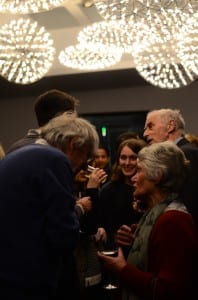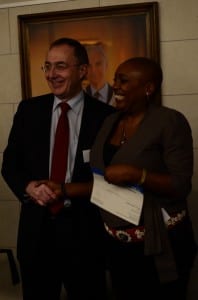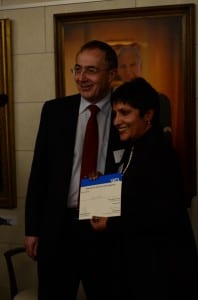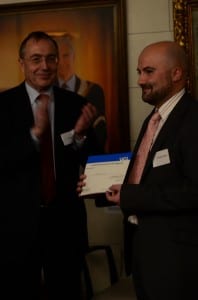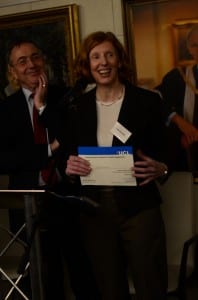UCL community turns out for the Provost’s Public Engagement Awards
By Clare S Ryan, on 30 January 2014
Public Engagement at UCL is a ‘big deal’. Throughout the year, students and staff at all levels reach out into their communities, expertly guided by UCL’s eight-person strong Public Engagement Unit.
So it was no surprise to find a real cross section of the UCL community at the fifth Provost’s Public Engagement Awards. In the jam-packed venue, I spotted deans, PhD students, heads of professional services, undergraduates, lecturers and personal assistants.
There were even some real life members of the public who had come with their children to the event – giving it a real sense of celebration.
Presenting the awards, after the jazz band and lively audience had eventually piped down, ‘new’ Provost Professor Michael Arthur expressed his enthusiasm for the achievements in this area.
“It’s fantastic to come to UCL and see such a commitment to public engagement. It’s tremendous,” he said. “My experience in Stratford and the excellent work that we’re already doing there has highlighted the real importance of two-way public engagement.”
So, without further ado, here are the winners:
Joint winner: Engager of the year (student)
Nadia Abdul-Karim, UCL Departments of Chemistry and Security & Crime Science
Nadia Abdul-Karim has shown real organisation and drive to become a leader in public engagement, not only in her two departments (Security and Crime Science and Chemistry) but among fellow PhD students across UCL.
Nadia’s collaborative leadership style ensured the success of the recent SuperLAB project, which brought scientists together with an adult audience, tackling science subjects in the context of superheroes and villains.
Joint winner: Engager of the year (student)
Ego Ahaiwe, UCL Information Studies
Ego Ahaiwe has shown an outstanding commitment to public engagement. Her energy and enthusiasm for her work stem from her interest in how archives and archival practice can be used to give a voice to the experience of often marginalised or hidden groups within society.
Building on her Beacon Bursary-funded project ‘We Are Here’ – a weekend retreat bringing together black women from different backgrounds in the UK to explore Black British feminism – Ego has sought to create ongoing links between non-academics and people at UCL to draw on archival records to uncover hidden histories.
Winner: Engager of the year (professional services staff)
Manjula Patrick, UCL Deafness Cognition and Language Research Centre
This prize rewards Manjula Patrick for the work that she has done to encourage colleagues in public engagement and the leading role she has taken in her department. Manjula conceived and organised ‘The History of British Sign Language (BSL) exhibition’, which took place in July last year and ran for a month.
The exhibition raised awareness of BSL’s history within our local community, UCL’s wider academic community and an international audience.
The exhibition was also visited by parents of deaf children, professionals providing services to deaf people (such as teachers, speech and language therapists and interpreters), deaf arts groups, trade union groups and workers in the public sector and charitable organisations. Manjula’s prize rewards her outstanding commitment to public engagement as part of an outstanding department.
Winner: Engager of the year (researcher/academic grade 6 or 7)
Dominic Furniss, UCL Interaction Centre
Dominic Furniss has been a great source of public engagement ideas within the UCL Interaction Centre. His ‘microwave racing’ and Errordiary projects have raised awareness of human computer interactions and errors, and through these projects and others, he has developed quite a range of engagement activities.
As well as leading public engagement activities himself, Dominic has acted as an advocate for public engagement among his colleagues. For example, he has encouraged peers to get involved in Bright Club, public engagement workshops and other activities.
Dominic’s enthusiasm for public engagement has made him the standard-bearer for public engagement, leading the way for his peers and making a real contribution to a change in culture at UCL and beyond.
Winner: Engager of the year (researcher/academic grade 8 and above)
Dr Jayne Kavanagh, UCL Academic Centre of Medical Education
Jayne Kavanagh is completely committed to involving members of the public in her work in exciting innovative ways. She does this not just to enhance learning for the 1,700 medical students who she is responsible for teaching ethics and law to, but also because of a deep-seated desire to improve the lives of people, particularly women, experiencing various difficulties.
She was nominated for this award for her leading role in creating and running the Beacon-funded 2013/14 project ‘Stories from the soul: doctors’ choices, women’s lives’ – although she also involves the public in her work in many other ways.
‘Stories from the soul’ includes three evenings of storytelling music, and discussion that bring together healthcare providers with members of the public to explore how doctors’ decisions affect women’s lives.
Public engagement is fundamental to how Jayne approaches her role at UCL. Even before “public engagement” became something that universities prioritised, involving non-academics in improving the quality of her teaching has always been key to her approach.
Winner: Career Achievement Award
Michael Edwards, UCL Bartlett School of Planning
Michael Edwards’ work bringing planning students together with London citizens and groups has made exceptional changes both at UCL and to the lives of the people he works with in London.
Among other activities, Michael has been a vociferous proponent of community interests in the King’s Cross regeneration scheme. He has developed strong networks and is keenly involved in supporting community interests both in and beyond his UCL teaching and research.
Through his work, Michael has begun to embed public engagement in the practice of many of his colleagues and students.
His work has also enabled communities to take action in ways that would not have been possible otherwise and draw effectively on the resources that the university can offer. This exceptional award is being made to an exceptional person, and the panel was pleased to be able to reward his remarkable contribution.
Final remarks
What was really nice about the winners was how much they had supported their peers in getting involved in public engagement, and how clearly they could show how public engagement had benefited their work, whether it was in learning, research, teaching or supporting their department.
Jayne Kavanagh said that “the insights that the arts have on medical education has been transformational”, while Michael Edwards said that his public engagement project allowed him and his team “to use the university as a resource to frame the city of the future, which, otherwise, is a very difficult thing to do.”
A full acceptance speech from Michael is on his blog, and you can find out more about public engagement at UCL, as well as full biographies of all the winners, on the Public Engagement Unit website.
Photography by Tirion Jenkins
 Close
Close


